Top Forex Strategies for American Traders
Top Forex Strategies for American Traders
Blog Article
How to Choose a Forex Broker in America
Foreign trade, or Forex trading, brings millions of members in the United Claims every year. Their utter size and liquidity ensure it is one of the most fascinating areas globally. Nevertheless, forex trading for beginners. takes a special and rigid way of regulating Forex activities. If you are seeking to trade currencies or just desire to know the way legal frameworks form the Forex market, understanding these rules is crucial.

Crucial Legal Frameworks Surrounding Forex in the US
Forex regulation in the United States is distinguishable because of its complete risk controls and customer protections. Two major government bodies oversee many Forex activities:
• Item Futures Trading Commission (CFTC)
• National Futures Association (NFA)
The CFTC, produced in 1974, is assigned with regulating the futures and options areas, international exchange included. The NFA, as a self-regulatory business, operates closely with the CFTC to enforce rules and maintain fairness in trading practices.
Enrollment and Submission
Every Forex vendor or broker doing business with U.S. residents should register with both CFTC and NFA. These entities will also be needed to stick to demanding functional criteria, including:
• Minimum net money requirements (often more than in different countries)
• Constant audits
• Powerful anti-money laundering (AML) plans
• Clear risk disclosure
Violations can lead to significant fines or a lasting bar from the market. That regulatory construction seeks to avoid scam, protect investors, and enhance market integrity.
Key Constraints on Forex Activities
Foundational protections affect how Forex works in the U.S.:
• Control limits: The NFA models a maximum leverage of 50:1 for major currency pairs and 20:1 for minors. This really is far below many international areas, helping protect unskilled traders from significant losses.
• Segregation of funds: U.S. legislation involves that customer resources are kept split from broker functional funds. This calculate safeguards traders in the case a broker becomes insolvent.
• Marketing and disclosure: Firms should clearly explain dangers, expenses, and trading mechanisms to clients. Inaccurate or hostile solicitation practices experience strict penalties.
Enforcement and Penalties
U.S. agencies regularly monitor for fraudulent schemes, insider trading, and illicit market manipulation. Statistical information from enforcement studies reveals a steady structure of penalties and settlements lately, highlighting ongoing vigilance. This atmosphere, while stricter than most areas of the entire world, produces a safer enjoying area for retail and institutional traders alike.
What things to Consider as a US Forex Trader
New tendencies show a continuous rise in regulatory measures, a focus on client education, and constant updates to conformity requirements. If you plan to industry Forex in the U.S., it's necessary to:
• Validate a broker's active registration position
• Remain up-to-date with regulatory improvements
• Review risk disclosures prior to making trades
This method minimizes unforeseen losses and enhances your prospects in a tightly managed but powerful marketplace. By understanding legitimate rules, U.S. traders can confidently take part in the Forex market while staying within the variables of the law.
Report this page